



























































Spring is in the air and so is the chance to win big while supporting a great cause!

You are an important part of our community, and your generosity ensures that one of the ways we’re able to make a vital difference to people’s lives is through our flagship IBD Nurse Specialist Programme.

Only 14% of IBD services across the UK reported having enough IBD Nurse Specialists to support their patients (Crohn’s and Colitis in the UK: The Hidden Costs and a Vision for Change, 2021)
Your support this spring can help give IBD Nurse Specialists the necessary skills and resources they need to make a positive difference in the day-to-day lives of people living with IBD. Take part in the raffle for just £1 a ticket and you could win up to three cash prizes and help support the education of up to 16 IBD Nurse Specialists ISOBEL MASON Nurse consultant
crohnsandcolitis.org.uk/springraffle or call 0370 058 5956





Welcome to the 100th edition of our magazine. As well as bringing you the latest on our research and policy work, Connect is an important place to share stories and experiences that really help people understand that there is hope and that this is a community who cares.
Much has changed since our first newsletter was delivered to members in 1990. Over the years, our ever-improving website and social media channels have made it much easier for people to access information about Crohn’s and Colitis and connect with other people with the conditions. On page 16, discover how our virtual events are bringing more people together than ever before.

Today, there is less of a taboo about talking about bowels, which is an important area of our work. On page 18, read about our drive to make more people aware of the symptoms and avoid delays to diagnosis.

We’ve also made great strides in addressing issues that are linked to the conditions. People with Crohn’s and Colitis have told us for a long time how their emotional and mental health is affected. Now, with more people feeling able to talk openly about mental health, it’s become easier for those affected to share the wider impact of their conditions. On page 29, Anna tells us about her experiences of turning to therapy to manage the fall-out from her diagnosis.
Taking a more holistic approach as to how Crohn’s and Colitis impacts people’s lives, we have done a lot of work to understand fatigue and pain, and offer support to manage these. On page 22, read our evidence-based advice on how physical activity can help alleviate fatigue. And looking to the future, on page 15, Consultant Gastroenterologist Professor Sebastian Shaji shares his insights into the exciting new research developments that are on the horizon.
While we celebrate the progress we’ve made, there’s still lots of work to be done. We always want to hear your lived experiences and find out what’s important to you, so that we can put your needs at the centre of everything your membership helps us strive to achieve.
Everyone with

Bowel Disease should receive safe, consistent, high-quality, personalised care, whatever their age and wherever they live in the UK. We need your support to make this happen.

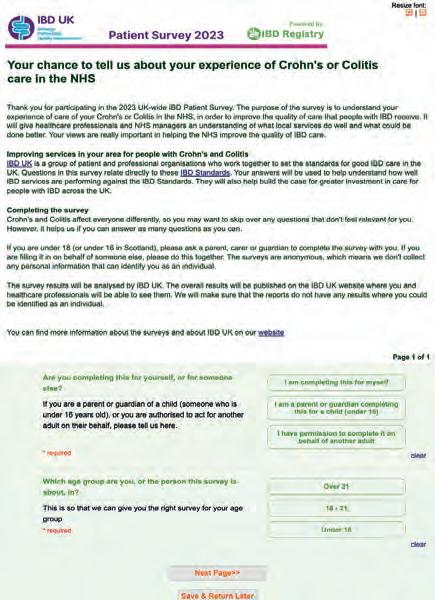

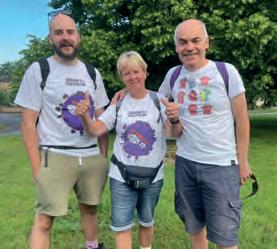
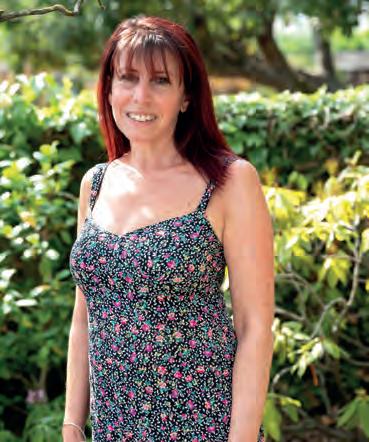
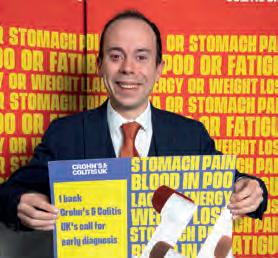
Whether it’s sporting a daring hair-do, baking for the masses or taking on a thrill-seeking challenge, we have lots of ideas for people who want to raise funds.
We’re on hand to offer help and advice, plus we have lots of downloadable fundraising resources, including badges, invites and posters, to help you get started.
We spoke to fundraisers to find out what inspired them.
Callum Bell, 21, from Colchester, dared to dream big after being diagnosed with Crohn’s last year. Now on medication to manage his condition, Callum has teamed up with his parents, Tracy and Reginald, to fundraise to help others in the same position.
The family has created a shocking list of dares that they
are livestreaming on Twitch to raise money for our cause. The list includes Callum shaving his head and eating the world’s hottest crisp.
So far, the trio have raised more than £640. Callum says: “I’m hoping the funds can help the charity do more promotional work online and raise money for people
like me who didn’t know anything about Crohn’s before it dropped into their life.
“I’m still learning with everyone else and I hope that other people can talk about their own diagnoses on the stream.”
Summit to shout about No mountain was too high for fundraisers April and Ed, who climbed Mount Kilimanjaro in Tanzania to raise over £3,000 for us.

April, who lives with Crohn’s, says: “So little is known about this chronic illness and unfortunately it left me bedridden for the early part of my 20s.
“There is currently no cure for Crohn’s Disease and a flare-up is possible at any time. This needs to change. We need a cure.”
If you have Crohn’s or Colitis, you are likely to be prescribed medicine as part of your treatment. We’ve updated our medicines information on steroids, methotrexate, 5-ASAs and ustekinumab.
We also have new information on ozanimod and upadacitinib, which were
recently approved for some people with Ulcerative Colitis.
Reproductive health: This information is for people with female reproductive organs and people with male reproductive organs. It covers puberty, periods, menopause, fertility and contraception.
Transition – moving to adult care:
We wrote this information with the help of young people and their parents. They shared their stories with us so we could give you tips to help make the transition easier.

Our weekly lottery gives you the chance of winning an amazing £25,000
Crohn’s & Colitis UK member Janis Dobson, 54, won a life-changing £25,000 playing our weekly lottery.
Janis lives with Ulcerative Colitis and has been a member of our charity for 20 years. She previously volunteered with the Gloucester Local Network Organising Team and took part in our virtual Land’s End to John O’Groats fundraising walk in 2021.

“It really is life changing. I still can’t believe I’ve won”

After seeing our weekly lottery advertised in Connect, Janis started to buy tickets, but never imagined she’d have such a big win.
She says: “I got the call telling me I’d won on my birthday, which was a really lovely surprise. It took quite a while for the news to sink in. The next day, I went out and treated myself to a bottle of Chanel perfume. I’d wanted it for ages, but couldn’t justify spending so much money on myself.
“I’ve shared some of my winnings with my family, and my husband and I are going to book a nice holiday. I’ll be making a donation to Crohn’s & Colitis UK too. It really is life changing. I still can’t believe I’ve won.”
Our weekly lottery gives you the chance of winning a £25,000 jackpot, and at the same time helps improve lives of those affected by Crohn’s or Colitis. Each entry costs just £1 and the draw takes place every Friday.
crohnsandcolitis.org.uk/lottery
SEPTEMBER
This year’s AGM will take place on Saturday 23 September 2023. The AGM will be held virtually. Please see the AGM notice included with your magazine for further details.

We have designed a template for a personalised care plan
AWARE-IBD, our project to re-design services and deliver improved outcomes for people living with Crohn’s or Colitis, is testing new approaches to delivering services.
Researchers in Sheffield are working to design a structure to inform care teams what is important to people when they are receiving care. This will demonstrate how, and by how much, putting people in control of their care improves outcomes.
The team has recruited 283 people to the study, and in November they trialled a new
face-to-face clinic led by the IBD Nurse Specialists for those receiving biologics infusions at the Royal Hallamshire Hospital.
They also trialled a new IBD ‘consultant of the day’ clinic for people who are newly diagnosed, have changed biologic treatments or require urgent clinical review due to a flare-up.

Based on participants’ feedback, the team has designed a template for a personalised written care plan. This will now be tested to see how acceptable it is and whether or not it improves people’s experience of care.
We are funding seven exciting new research projects, the first to be awarded under our new research strategy, in areas of research that are important to people living with Crohn’s or Colitis.
The latest on our three-year project to shape better services 1)
We’re helping investigate a range of topics including fatigue, surgery and personalised medicine. We’ve recently opened up our 2023 grants call
and we’re asking researchers to submit project ideas in those same priority areas again.
These areas of research have not received significant attention and much progress is still to be made.
We hope that by focusing on these specific areas, we can build a body of work that will have a positive impact for those living with Crohn’s or Colitis.
Finally, the team is finalising an ‘IBD toolkit’ to help people communicate confidently with those involved in their care, developed by people with IBD and VoiceAbility.
Project manager Elena Sheldon says: “Involving people with Crohn’s or Colitis is at the heart of our project, and enables us to make meaningful changes to the IBD service.
“We’ve made great progress and want to thank everyone who has been involved so far. We are excited to see what the final year of the project brings.”
We’ve commissioned two pieces of research to find out the economic cost of Crohn’s and Colitis in the UK.
We’ve asked York Health Economics Consortium to tell us how much Crohn’s and Colitis costs people living with the conditions, the NHS and wider society, and we’ve asked Newcastle University to find out the cost of delayed diagnosis.
Once complete, these projects will allow us to speak up for you and lobby for change with policymakers across the UK.
The Gut Reaction project has won an award for best practice and innovation in public involvement and engagement. The award was announced by Health Data Research UK at its annual conference in December.
Gut Reaction is a research project that brings together health data from thousands of people living with Crohn’s and Colitis across the UK so we can carry out research to improve the lives of people living with the conditions, faster.

With our support, Gut Reaction’s Patient Advisory
Committee was formed to make sure people living with IBD were involved in planning and decision-making.
The Patient Advisory Committee has made a huge impact on the Gut Reaction hub – in particular, influencing the processes for using the health data collected during
the project and beyond. They also developed training materials to support patient and public involvement in health data research.
The judging panel from Health Data Research UK felt that the training materials will continue to be an exceptional resource and a contribution to public involvement and engagement that will remain valuable well into the future.
If you’re not yet receiving our emails, contact us: membership@crohnsandcolitis.org.uk
“People living with IBD were involved from the start”
In a third of patients with Crohn’s Disease, the condition affects the join between the small and large bowel. People are often given powerful medicines to control their symptoms and evidence shows that almost everyone who has disease in this part of their bowel ends up having an operation. However, usually surgery is only carried out after all possible medicines have been tried and have not worked.
All treatment options have risks and the disease can come back even after treatment. However, recent research has shown that an early operation before starting some medicines may make the disease less likely to come back. It may also reduce the need to take medication.
With this in mind, the Early Bowel Resection for Terminal Ileal Crohn’s Disease (E-Bric) study will look at the timing of surgical options. Clinical Research Fellow Nilofer Husnoo says: “Despite evidence suggesting that doing an operation sooner might have some benefits for patients, surgery is generally seen as a last resort.”

The researchers will interview patients about how they choose treatments and what influences their decisions.
They will then study how patients weigh up pros and cons to decide whether to continue treating their Crohn’s Disease with medicines or if they’d rather have an operation.

“There have been lots of studies exploring how different medications impact quality of life for the patient, but there’s a lack of similar research into surgical outcomes,” says Nilofer.
“At the moment, patients and doctors seem to prefer medicines to surgery. There are no clear reasons for this, so the research aims to find out why.
“Earlier surgery could mean patients go for longer periods before needing more operations or it could mean they don’t need treatment post-surgery. If there’s a real benefit to having an early operation and patients aren’t getting it, that means they’re not getting the best possible care that they could have.”
The research team, led by Nilofer and Professor Steven Brown, will gather patients’ views to find out what makes them opt for either medicines or an operation. They will also explore with patients when they think surgery should happen. Researchers will then test how patients weigh up pros and cons when making a choice about their treatment.
They will also speak to patients who have had surgery on this part of the bowel about their experiences to explore whether they regret the timing of their operation.
“This sort of work has never been done before,” says Nilofer. “There’s an opportunity for patients to understand their options better and it may affect how we look after people. This project will also help us set up larger studies to answer the question of which is better: early surgery or medication.”
crohnsandcolitis.org.uk/

“Surgery is generally seen as a last resort”Nilofer Husnoo


The current incarnation of our membership magazine, Connect, was launched in 2015.


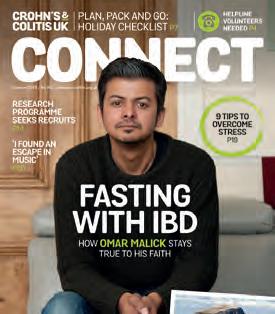

It brings you everything from the latest medical and research news to events and feature stories. As its name suggests, Connect is an important way of


connecting people living with the conditions to one another, and to our cause. We recently welcomed the 50,000th member to our community.

Our members feed into consultations, share their lived experiences, campaign with us for better health services and help us end the disadvantage
that people with Crohn’s and Colitis can face in welfare, education and employment.
Through these pages, we’ve been able to reach and support so many members. Here, we celebrate all that we’ve achieved together so far, and look at what the future holds for our community.
Our charity was started off as a grassroots support network by Robert and Patricia Annetts, after their daughter Deborah was diagnosed with Crohn’s Disease. We have continued to evolve into the respected UK-wide charity that we are today.
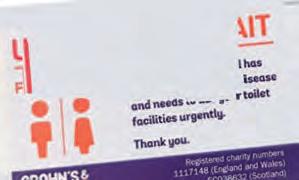
We awarded our first medical research grant in 1984. Since then we’ve given more than £12m towards research.
Our first helpline service was established. Today, our helpline team provides information on a range of subjects including managing symptoms, medication, diet, employment, wellbeing and much more. They can also help callers find support from the Crohn’s and Colitis community and signpost to expert advice on disability benefit and specialist emotional support.



Our first local network was founded in Mersey. Today, 47 local networks, run by a team of volunteers, operate across the UK. From educational talks to social events, they help give people the comfort and confidence to live freer and fuller lives.
The launch of the Can’t Wait card. Designed to be discreetly tucked away in a purse or wallet, our biodegradable Can’t Wait Card is now available in 30 different languages for travelling abroad. It makes it easier for our members to ask to use toilets in shops, restaurants and other venues, without having to give a long explanation about their condition.
The first issue of the NACC newsletter was posted out to members.

Th• holder of thls cord hGS lnficimmGtoryBo'ttilllOise:nse andneedstou.seyourtoilet fo,:;:ilitiesu.rgently.

ThGnl<yoU.

1994
The start of our Living with IBD research grant.
0 0 i




2002
2016
Our flagship fundraising event, WALK IT, was launched.
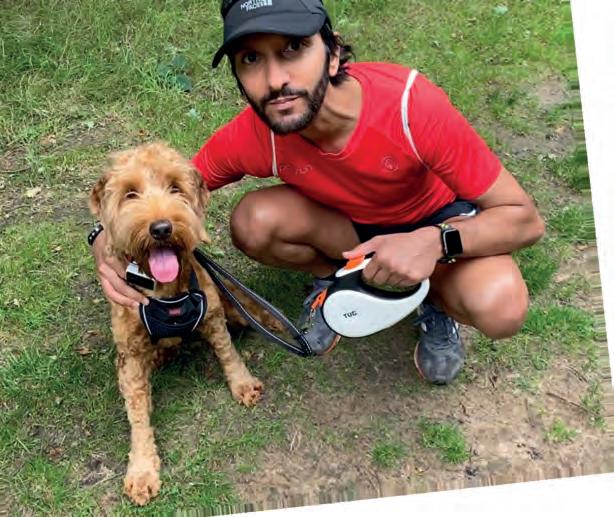

Our award-winning campaign, Not Every Disability is Visible, was launched. It has challenged public perceptions through inclusive toilet signage and training.
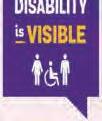
1998
The NACC website was launched.

Lending support
2019

We launched the IBD Nurse Specialist programme.
2023
We welcomed our member.
50,000th
•••
We’ve boosted numbers of IBD Nurses across the UK
Our award-winning Not Every Disability Is Visible (NEDIV) campaign was originally inspired by Grace Warnock, a teenager from Scotland living with Crohn’s Disease, who designed her own accessible toilet signs to help raise awareness of people living with hidden disabilities. Many high street stores, supermarkets, restaurants and travel hubs have come on board in the years since, changing their accessible toilet signs and training staff to understand Crohn’s and Colitis.
NEDIV has made a huge impact, raising awareness that someone can look ‘well’ on the outside and still have a real and urgent need to use an accessible toilet.
Over 83% of people we surveyed in 2019 said they feel more comfortable visiting somewhere the signage is installed. This means our campaign work is really making a difference to people’s everyday lives.
Over the last three decades, our campaigns have effected real change. Recently, It Takes Guts has helped to reduce stigma around the conditions, while Are You IN? is continuing to make workplaces more inclusive. And our newly launched Early Diagnosis campaign is already raising awareness of the symptoms of Crohn’s and Colitis.
We want everyone living in the UK to have access to a suitably qualified IBD Nurse Specialist. We know that IBD Nurse Specialists are working at an advanced level, often running clinics by themselves, prescribing medication, and ordering investigations. But most IBD Nurse Specialists are not educated to MSc level, the level recommended for advanced practice.
So, our Nurse Specialist programme funds and supports nurses to complete an MSc in Advanced Nursing Practice or to credential with the Royal College of Nursing. It also brings them together four times a year to share learning and provide peer support. We now have 27 Crohn’s & Colitis UK Nurse Specialists across the UK and will be recruiting more in 2023.
We’ve also been working with the Royal College of Nursing (RCN) to develop a career framework for IBD Nurse Specialists and have just completed a new audit of the IBD Nurse
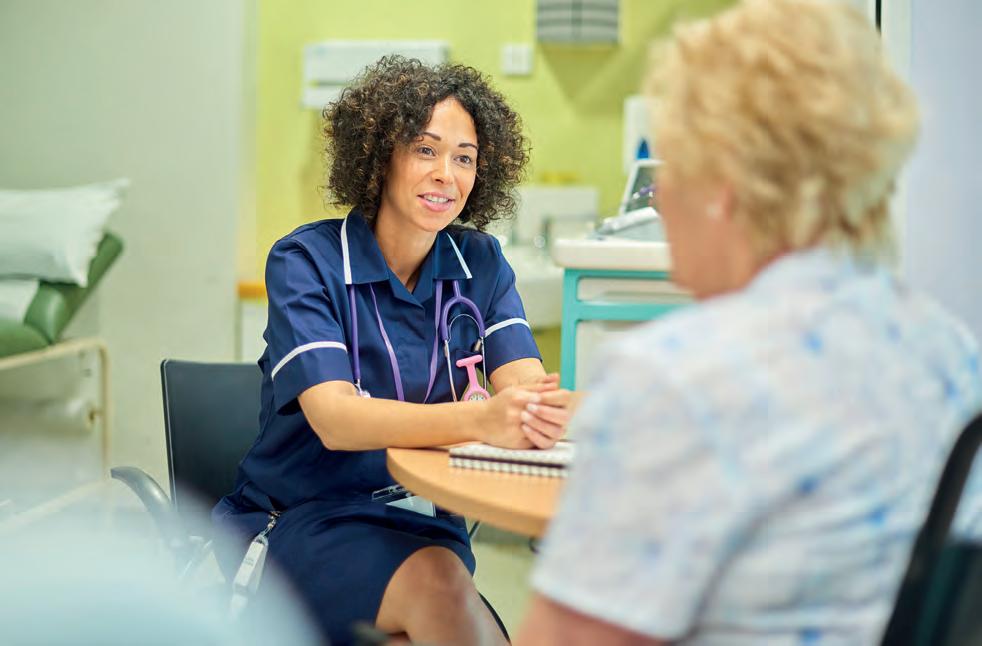
“Our campaigns increase awareness and understanding of Crohn’s and Colitis”
Your membership plays a vital role in helping us reduce stigma and improve treatments and care
Specialist workforce, following on from our last audit in 2019. We look forward to sharing these results.
The research we fund addresses key areas of importance to people living with IBD. Since 1979, we’ve awarded research grants worth over £12.4m.
We believe it’s vital that the views and experiences of people affected by Crohn’s and Colitis are embedded in all areas of Crohn’s and Colitis research. Since we launched our


We’ve championed toilet access
At our recent Patient and Public Involvement day, we had: unique attendees researchers taking part
141 9 10
603 8 4
webpage views staff members involved in running the event focus groups live polls
Taking Part in Research Initiative in 2016, over 250 researchers have asked us to help recruit patients to their studies or for help in shaping their research.
The ultimate goal of most of the medical research we fund is to prevent or find a cure for Crohn’s or Colitis. It is likely that there is not a single cure or solution, just as there often does not seem to be a single cause or reason why someone has developed Crohn’s or Colitis.
Biologic medicines are one of the main types of treatment for IBD. But people respond differently to each type of biologic, with some people not responding to any of them. Researchers are working on different ways to predict which biologic will work from the start, avoiding the ‘try it and see’ approach that doctors currently have to take – this is called personalised medicine.
Since 2017 we’ve invested over £500,000 on projects focused on personalised medicine. These studies are looking at a range of different approaches to personalised medicine including developing a blood test to predict response to biologics, and investigating how the microbes in your gut will affect how you respond to medication.
Our fundraisers help us to support those in need, campaign for better services and fund vital research into treatments
Anne Swanston, from Hertfordshire, has been raising funds for Crohn’s & Colitis UK for the last 20 years
My husband, Ian, died in 2002. Part of his illness, which was diagnosed quite late, was Ulcerative Colitis. After losing him I wanted to do something to keep his memory alive and raise awareness of the condition as in those days, it wasn’t very well recognised at all.
The first event I hosted was a charity golf day, because Ian was always on a golf course. We’ve had about 25 events in total over 20 years, raising more than £250,000. For me, it’s a way of giving back to the charity. One of my main drivers is raising awareness – Crohn’s and Colitis are such
debilitating conditions.
Being a member of the charity keeps me in the loop about what’s happening on a daily basis to improve the lives of people living with these conditions. The fact that there is greater awareness now is so important.
Sarah Sleet, our CEO, says: “Anne is an incredible inspiration to us, to raise over £250,000 is an outstanding achievement. Anne’s wonderful dedication to Crohn’s & Colitis UK shines through in each of her fundraising events and we are truly lucky to have support like hers.”
When four friends got together in 1978 to start raising money for charity, they never imagined their efforts would span more than four decades…
From supper quizzes, a car rally, a Caribbean pool evening and even a record-breaking attempt to visit all London Underground stations in one day, fundraising group Pennies from Heaven has donated more than £50,000 to us over the 45 years they’ve been running.

“We would email friends and invite them to the quiz suppers or mention the charity to people we met on holiday,” says founder Peter Altman.
Alan Franks, a key member of the committee and chair of
Pennies from Heaven 11 times, died last summer, aged 78.
Linda, Alan’s wife of 52 years, says: “He helped lots of local charities and hospices, but supporting Crohn’s & Colitis UK was really important to him because our daughter, Justine, was diagnosed with Crohn’s Disease in her early 20s.”

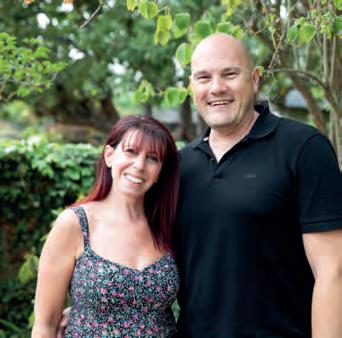
“I’ve never seen a group like it,” says Sarah Sleet, our CEO. “It’s so rare to find a group of people who are so dedicated to fundraising year after year.”
Pennies from Heaven have supported us and each other

Gastroenterologist from the IBD Unit at Hull University, looks to the future


(AI)

AI will really impact on every aspect of IBD care.
People may think of AI as very challenging or even a threat in some cases, but for me I see it as a huge opportunity to make our lives easier and as something which may aid us in improving care for our patients.
For example, using Natural Language Processing to make better sense of data and simplify its interpretation and presentation, or using AI to give you real-time feedback in relation to your interpretation of an image in a colonoscopy.
I think AI will be a massively helpful tool in gastroenterology, and specifically in IBD.
I think this is one of the most important areas of research. We need to better understand the triggers of the conditions. We know
that genes play an important role, but they are probably more a component part of the trigger.
Thanks to a better understanding of the changing epidemiology of Crohn’s and Colitis, it seems clear that the answer is in the environment.
These conditions used to be considered to mostly affect the Caucasian population, but now, the biggest increase in incidence is in Asia and South America.
That suggests that clearly environmental factors play a role. We need to understand what those factors are, and how early in life are those environmental factors relevant. There are great quality studies
going on looking at mothers, infants, and the microbiome in early life.

I think it’ll take a global effort to really bring all the research together and further our understanding of the cause.
It’s an exciting time. There are already a handful of new individual molecules that have been approved in the last 12 months or are in late stage studies and there are more on the horizon.
The first study of combination biologic agents has just been published and there are at least four other trials combining existing medicines and those are due to be launched this year. The hope is that we’ll be able to go beyond our current therapeutic limitations and help more people achieve what we’d class as remission.
That’s the hope, but this has to be balanced against risks of medications. That is why this is something that must be properly tested.
 WORDS MIYO PADI
WORDS MIYO PADI
When Hannah was diagnosed with Ulcerative Colitis in 2013, Crohn’s & Colitis UK was the only real source of information available to her at the time.
“Not many people were talking about it online and I felt really alone,” says Hannah, who is now one of our virtual event volunteers.
Understanding just how important it was to bring people together during the pandemic –
and beyond – we had to find new ways of doing things. So, we created virtual social events to keep people connected and provide vital peer support.
Last year we hosted 70 virtual events, including six specifically for parents and
carers of children with Crohn’s or Colitis.
Recent feedback shows they continue to be a real success, with 84% of attendees saying they felt less isolated since attending a virtual event, and had made a connection with other people affected by or living with Crohn’s or Colitis.
“Everyone is made to feel warmly welcome in a friendly environment,” one attendee said afterwards. “It was very helpful and supportive.”
And four in five attendees reported feeling more comfortable talking to others about Crohn’s or Colitis since taking part.
There are country-specific and regional events, but you can attend any of these events no matter where you’re based. The overall discussion is driven by those attending.
“It’s really nice to not feel so alone and isolated, being able to chat and share the one thing we all had in common – our IBD,” said another attendee.
“Volunteering as a virtual social event host makes me feel part of a community
that’s there to support each other,” says Hannah. “Volunteering never feels like a job – I look forward to it!
“It has empowered me. I’m more passionate now about breaking the invisible barriers –especially in the workplace.”
Another volunteer, Muzher, says: “Because I have Crohn’s, I believe I can tap into the experiences I have had living with Crohn’s – especially

past, I do wish I had started volunteering with Crohn’s & Colitis UK much sooner. I’d recommend it to everyone. It does take energy and commitment, but I feel you get more than enough back. I’ve attended many events, and it’s been great to meet a range of other folks to share experiences.”
Thomas Hough, our Volunteering and Local Networks Officer, says:
through my teenage years – to help support others.
“At the same time, I can learn plenty from other volunteers too. While I don’t dwell on mistakes made in the
“We’re really proud of what our volunteers have created and are so grateful for the time they give to support others. These events offer more flexibility for people who might benefit from peer support. Whatever your circumstances, we hopefully have a meet-up to suit you.”
96% OF OUR ATTENDEES WOULD RECOMMEND OUR VIRTUAL EVENTS TO OTHERS AFFECTED BY CROHN’S OR COLITIS
“It’s really nice to not feel so alone and isolated, being able to chat and share the one thing we all had in common – our IBD”
definitely be back at more”
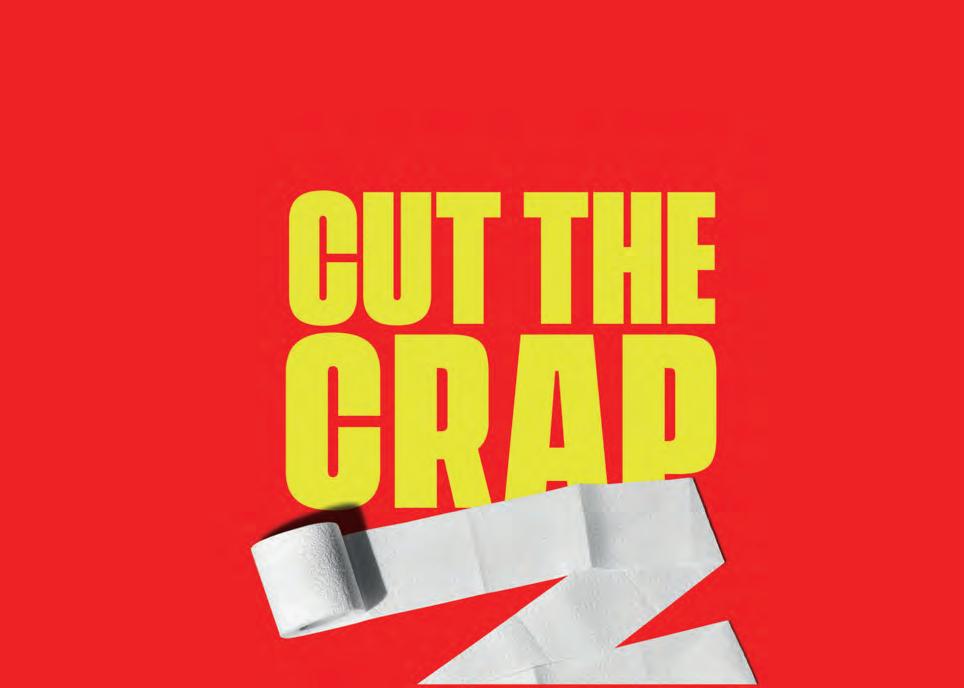
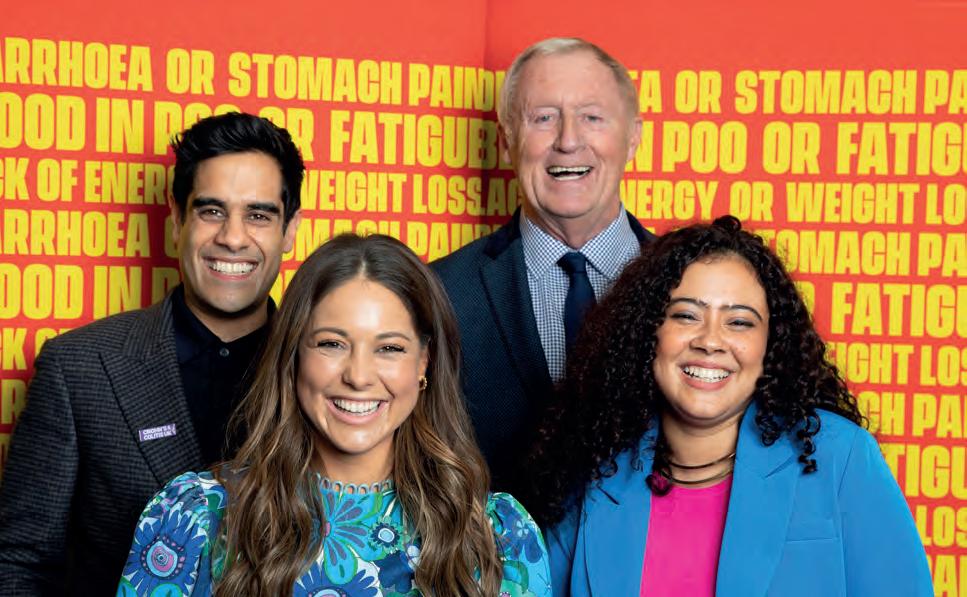
Our new campaign to empower young adults to recognise the symptoms of Crohn’s and Colitis and see a GP without delay is already making a huge impact
hen my wee brother was diagnosed with Ulcerative Colitis eight years ago, it turned our worlds upside down,” Hannah Bardell MP recently told Prime Minister’s Questions.
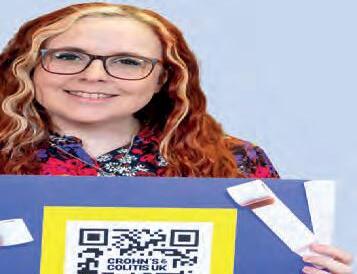
“Given one in four people wait over a year for diagnosis, will the Prime Minister and the House support the awareness campaign, Cut the Crap: Get Checked?”
Hannah Bardell’s Livingston constituent Steven Sharp has Crohn’s Disease. After he used our campaign toolkit to seek support for our campaign, PM Rishi Sunak welcomed Hannah’s request for a meeting to discuss support, research and funding for Crohn’s and Colitis.
The PM agreed that these are very difficult conditions for people to live with and added: “I look forward to that discussion.”
We launched our Cut the Crap campaign to make people aware of the symptoms and consequences of Crohn’s and Colitis. We are working with policy-makers, charities and
clinicians across the four nations so that every GP knows about Crohn’s and Colitis, and that they have a new clear pathway to refer people on to hospital so they can get diagnosed, get treated and get their lives back. And it’s been making a huge impact.
Our parliamentary launch events in Westminster, Wales and Holyrood brought together over 90 parliamentarians, IBD nurses and health leaders. Throughout the summer, you’ll see adverts on digital platforms and in spots such as gyms, university halls and student unions. Please take a selfie with them and tag us on social media: #cutthecrap.
So far, our online symptom checker has been completed by over 60,000 people, who received information on whether they should contact their GP about their symptoms.
Baroness Young hosted the campaign launch in the House of Lords. Alongside MPs and clinicians, we welcomed our ambassadors –actor Sacha Dhawan, singer Tom Speight, TV presenter Chris Tarrant and reality TV star Louise Thompson.

“My symptoms were diarrhoea and cramping very soon after eating food. If at the time I’d had the symptom checker, I would have maybe been like, ‘Oh my goodness, that’s me.’ I could have printed off the symptom checker and gone to my next GP appointment feeling more confident and able to self-advocate.”


“If you have symptoms, you should not delay in speaking to a healthcare professional”
OUR CHAIR
Dr Jackie Craissati MBE
SIANNY THOMAS, AT OUR WALES LAUNCH
In Northern Ireland, we have secured the backing of the Deputy Chief Medical Officer, Dr Lourda Geoghegan.
In Scotland, we have support from Jessica Henderson, the National Associate Director at the Centre for Sustainable Delivery.
In England, we worked to influence the NHS England bowel cancer pathway so that people with Crohn’s and Colitis are appropriately prioritised for endoscopy.
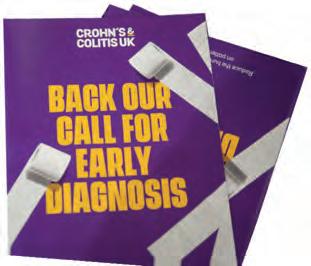
In Wales, we have worked with the Health and Social Care Committee to consider whether the investment in endoscopy services has improved outcomes for people with suspected Crohn’s and Colitis.
Our Chair, Dr Jackie Craissati, explained how recent research had revealed that 6% of people would avoid going to see their GP if they saw blood in their poo, and one in six would delay talking to their GP because they felt embarrassed discussing their toilet habits.
Sacha Dhawan shared his experiences of being diagnosed with Crohn’s Disease in 2006 after seeing a huge amount of blood in his poo. And Dr Robert Logan, NHS England National Clinical Adviser on Gastroenterology and Endoscopy, spoke about the toll of Crohn’s and Colitis.

“It’s hidden, it’s incurable and it’s lifelong,” he said.


SCOTLAND LAUNCH
Making our call heard
“With Crohn’s and Colitis, we need to create more awareness and get people talking about it more. For years, I sat in silence. I didn’t speak to any friends or family until I stumbled across Crohn’s & Colitis UK. Since I’ve spoken about it, I feel like I’ve finally connected to a huge part of me.”
SACHA DHAWAN, AT OUR LONDON LAUNCH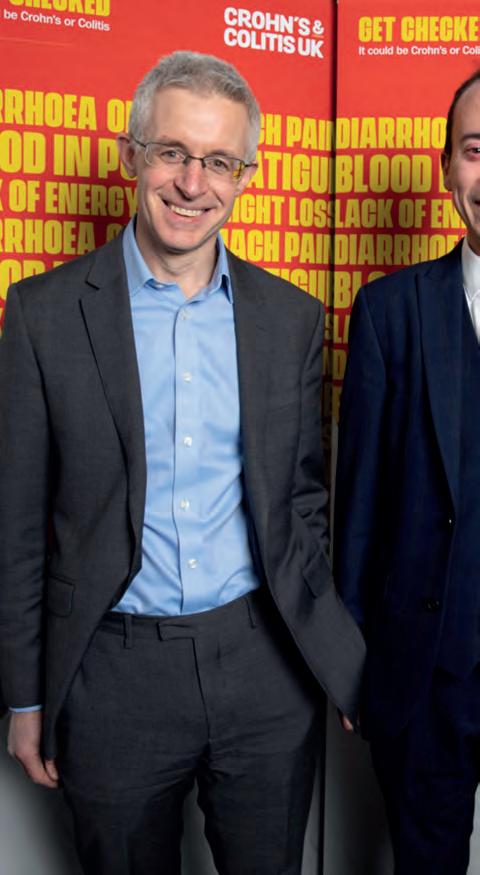
From day one, our campaign received support from the Minister for Health and Social Services, Eluned Morgan MS. Speaking about the work being done in Wales to ease pressure on endoscopy services and transform the lives of people living with Crohn’s and Colitis, she said: “Bowel conditions are notoriously difficult to diagnose, which is why we are committed to improving pathways and increasing diagnostic capacity through our programme for transforming care. I hope that working with Crohn’s & Colitis UK to ensure patient voices are heard means we can respond to the needs of the people who are going through each stage of their journey.”
Dr Barney Hawthorne, National Clinical Lead for IBD in Wales, said: “This campaign is absolutely fantastic. It helps to get over that British reticence about talking about our bowels. The symptom checker highlights key symptoms and empowers people to see a doctor. If we can diagnose people early, we can transform their lives.”
Our Scotland launch was backed by Public Health Minister, Maree Todd. She said: “I absolutely love the campaign’s catchphrase. Raising awareness is crucial and I really believe this campaign will help to develop a deeper understanding of these conditions. It will provide tools to empower people to have open conversations with their GPs and ensure they can access appropriate treatment and support.”
The Scottish government has launched a campaign to raise awareness of Crohn’s and Colitis and encourage people with symptoms to get checked. This came as a result of our engagement with Humza Yousaf, now First Minister. It’s the first government-funded awareness campaign on Crohn’s and Colitis, and your membership has helped make it a success.
Our work on early diagnosis has just begun. We need GPs to know more about Crohn’s and Colitis so that when people present with potential symptoms, they get access to the relevant tests and referred to hospital where appropriate.
We are working with organisations that provide training and support to GPs and other community healthcare professionals, including the Royal College of GPs, to help them spot the signs and symptoms of Crohn’s and Colitis and ensure their patients get an early diagnosis.
We have also launched a range of resources, including podcasts, webinars, e-learning modules and toolkits. Ask your GP about them and direct them to: crohnsandcolitis.org.uk/HCP
Steven Sharp used our digital toolkit to raise awareness with his MP, and is now due to meet with the Prime Minister.



You can find our toolkit at: crohnsandcolitis.org.uk/ raise-awareness-with-your-politician

“This will help everyone with Crohn’s and Colitis to get the best possible outcome”
“I have first-hand experience of not being quick enough off the mark. When it’s not treated, Crohn’s can create havoc inside your body. It’s so important that increased incidence of these conditions is met with faster diagnosis. With that, we’ll see higher rates of remission and recovery.”
CALUM MACCOLL, AT OUR HOLYROOD LAUNCH
Being
Our virtual fundraising event, My WALK IT, returns in June. It gives people the chance to raise funds and awareness, with the flexibility to make the event their own.

Going at your own pace means you enjoy yourself and are likely to stick to what you are doing for a longer time. It’s also helpful for people dealing with what has been
described as the “most over-reported and undermanaged” problem for those living with debilitating medical conditions – fatigue.
When you live with Crohn’s or Colitis, fatigue may be caused by many different things. This means there are various approaches you and your healthcare team can try to help control your fatigue. It may sound surprising, but physical activity is one tool that can help.
active when you can is a helpful way of managing fatigue, one of the most debilitating symptoms of Crohn’s and Colitis
WORDS LOUISE ZECEVIC
One study found that people with Crohn’s and Colitis who exercise, even just a little bit during the week, feel less tired than those who do not exercise at all.
A research study we funded showed that high-intensity interval training (HIIT) or moderate-intensity continuous training (MICT) didn’t worsen symptoms in people with Crohn’s. At the end of the exercise sessions, people with Crohn’s said they felt “fairly good”.
They experienced a range of health benefits after starting the exercise programmes, including improved fitness, feeling more energised, increased motivation to exercise and a reduction in anxiety.
• If you find the idea of exercise daunting, try incorporating some mild activity into your daily routine. Walk to the shops if you can, use the stairs instead of the lift or try a bit of gardening. Just getting out of the house into the fresh air can help you feel more positive.
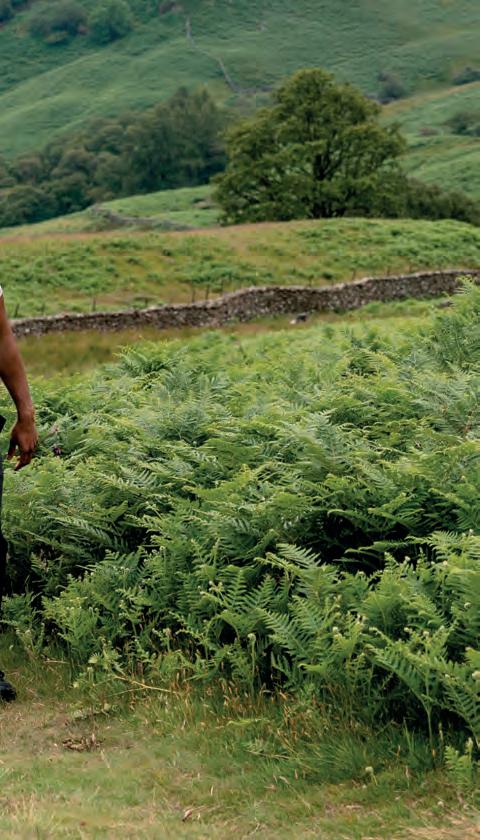
• To help build up your confidence, plan your route in advance if you are worried about needing a toilet urgently.
• Some people find that exercises such as deep breathing, deep muscle relaxation, meditation or yoga help them feel more able to cope with the daily stresses of living with Crohn’s or Colitis.
• Fatigue, like other symptoms of Crohn’s and Colitis, can come and go. Be kind to yourself. Knowing when to stop and take a rest can be difficult, but important.
Exercise releases endorphins, the ‘happy hormones’. Some research has shown that moderate cardio and resistance exercise may help with reducing disease activity and symptoms such as constipation, although more research needs to be done to be conclusive.
There will likely be times when you are less well, or too anxious about needing a toilet urgently, to take part in exercise. While even light activity can make some people want to open their bowels, taking exercise itself will not worsen your Crohn’s or Colitis. It’s essential to get enough rest, but doing physical exercise when you can will help maintain muscle and bone condition.
Go
•For more on managing fatigue, visit: crohnsandcolitis.org.uk/fatigue
•The NHS website has many free resources about exercise, particularly if you are not sure how to start. For more information visit: nhs.uk
Sign up for My WALK IT for free: crohnsandcolitis.org.uk/challenges/ my-walk-it
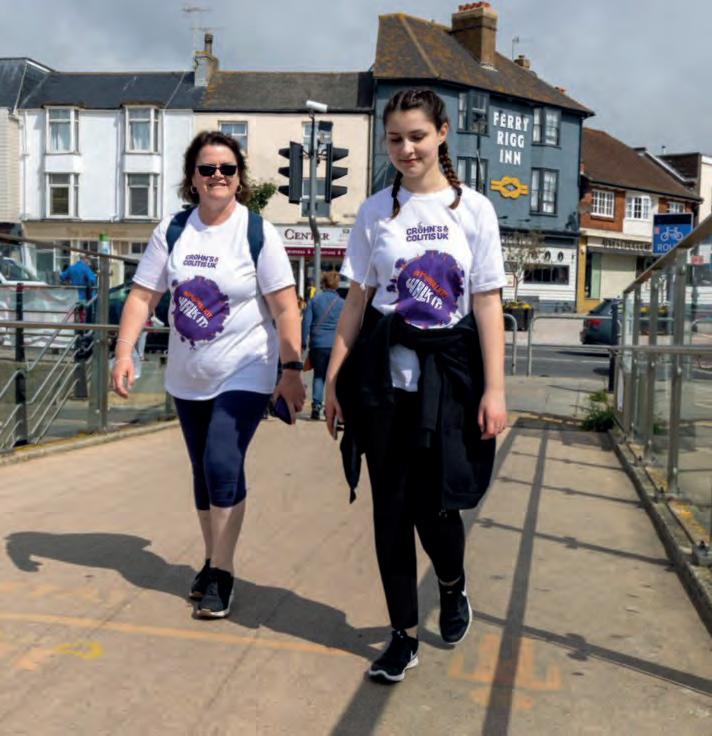
If you want to follow a structured exercise programme, take advice from your doctor and ask an exercise instructor to plan a programme tailored to your needs. You could also think about exercising at a gym, sports club or other indoor centre with toilet facilities. If you want to keep up an activity, but aren’t sure if you should carry on, speak to your healthcare team and rely on how well you feel at the time.
It’s important to understand how your energy is affected by your condition and be realistic about what you can achieve. People living with Crohn’s or Colitis can feel guilty, or that they are making a fuss over nothing, if they need to rest or cancel plans. Remember that you are living with an ongoing and challenging illness. There may be times when you feel low, anxious and tired. When this happens, take care of yourself and rest as much as you need.
Exercise programmes can improve fitness and help you feel more energised
There are so many different ways for members to participate in our work and support their charity

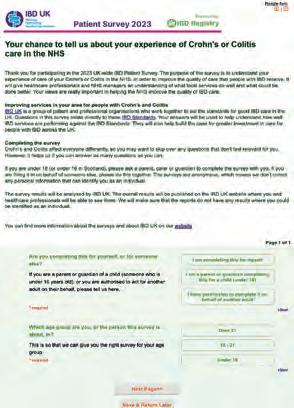
Crohn’s and Colitis care only improves when we listen to the people who experience it first-hand. People like you.
The 2023 IBD Patient Survey is your opportunity to tell us about diagnosis, treatment and care.
This year, the survey responses will be collected by the IBD Registry, a partner in IBD UK –an alliance of 17 organisations chaired by Crohn’s & Colitis UK.
IBD UK is dedicated to ensuring that everyone with IBD receives safe, consistent, high-quality, personalised care.
The last IBD Patient Survey took place in 2019, before the pandemic. Here we look back at how you helped to make a difference to the lives of people with Crohn’s and Colitis. Thank you to everyone who contributed their experiences and views.
1. Your voice at the centre of care
Over 10,000 people shared their experiences in the last patient survey. Your voices provided a unique picture of IBD care across the UK.
2. Influencing change
The IBD UK report set out clear recommendations to transform care, giving vital recognition of the specific needs of the over 500,000 people living with IBD across the UK.
3. Early diagnosis
You told us that early diagnosis would have made the biggest difference to your life. The result is our early diagnosis campaign, which so far has helped 60,000 people to get checked for Crohn’s and Colitis. We’re working with
policy-makers and healthcare professionals to ensure that early diagnosis is high on the agenda.
4. Improving local services
Your feedback, together with the team’s own assessment of their service, showed what was working well and what needed to improve.
5. Increasing visibility
Stigma means people often suffer in silence. We used the evidence of your experiences to raise awareness of the issues you face with MPs, health services and the media.
WE WANT TO HEAR FROM YOU! Tell us about your care and treatment by completing the 2023 IBD Patient Survey. Visit ibduk.org/patient-survey
Lace up your shoes and choose to walk a 5km, 10km, half marathon or marathon distance during the month of June. Take on your own challenge, your own way, in your local area. Do it solo or with friends; whichever way you choose, you’ll be supporting and raising vital funds for all those affected by Crohn’s and Colitis.

Registration is FREE and you’ll receive an exclusive My WALK IT T-shirt to wear with pride during your challenge. You’ll also have the chance to unlock amazing fundraising rewards along the way!
We can’t wait to see where your walk will take you!
REGISTER NOW crohnsandcolitis.org. uk/challenges/ my-walk-it

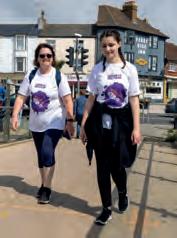



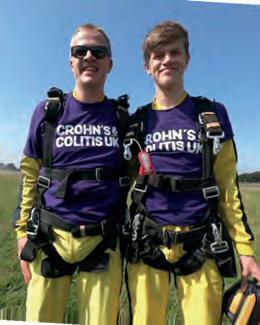

Adrenaline-filled adventures don’t have to be on the ground. Join us, and like-minded thrill seekers, for our dedicated skydiving day on 12 August.
Doing a skydive is an exciting and courageous way to support Crohn’s & Colitis UK, so we’ve set a date and a location –now we just need you!
SIGN UP TODAY
crohnsandcolitis.org.uk/skydive
Join our London Marathon team

“There’s nothing quite like the atmosphere when running the London Marathon,” says Natalie, a Crohn’s & Colitis UK 2022 runner. “The other participants were amazing and gave me the strength to carry on going – and, wow, the elation I felt when I crossed the finish line is a moment that I’ll never forget.”
We aim to be there for every single person affected by Crohn’s or Colitis, and with over 500,000 people in the UK living with one of the conditions, the funds raised from events such as the London Marathon help fund vital services like our Helpline.
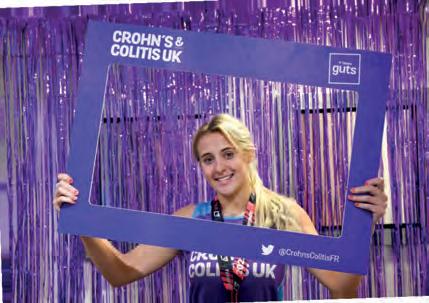







• Your jump and training are completed in one day
• You are harnessed to an experienced parachute instructor at all times
• You will be jumping from at least 10,000 feet

– just like the professionals
WANT TO BE A PART OF OUR MISSION?


Apply for one of our 2024 London Marathon Places today at: crohnsandcolitis.org.uk/ london-marathon-2024


I was experiencing weight loss and cramps in the run-up to my diagnosis of Crohn’s Disease in 2015. After trying one medication that stopped working, I am now on adalimumab injections every 10 days and my symptoms have mainly been kept at bay.
I only started running when I moved to London after the COVID-19 lockdowns.
Last year, I ran a 10k at the start of the year, followed by two half marathons, then my first full marathon in October. On some days, fatigue makes it hard to get up and out. But I quickly realised that running really helps me. If I lie in bed all day, I feel physically worse. When I am able to be active and have the focus of exercise, I find I have more energy.
Running also helps my mental health – stress aggravates my Crohn’s symptoms and exercise helps alleviate that. With the amazing support of my healthcare professionals and those close to me, my condition is now under control and I am in a position to offer the same support to others.
Knowing how life-changing a Crohn’s or Colitis diagnosis can
be, I wanted to have a fresh focus and do something to raise money for Crohn’s & Colitis UK. So I set myself the challenge of running
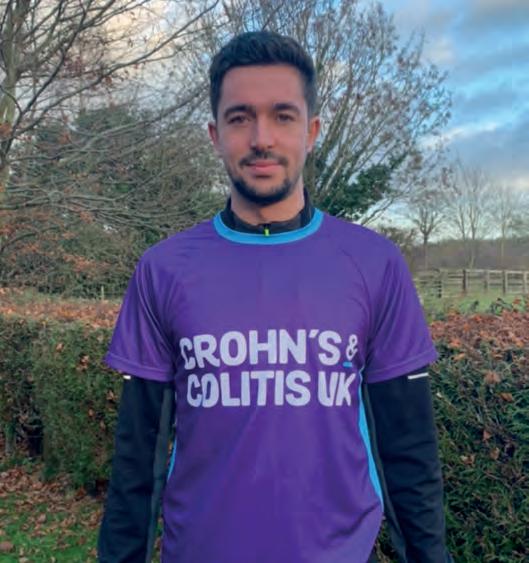
12 marathons in 12 months throughout 2023. I’m hoping to raise £3,000 for the charity.
Training is not always perfect. Sometimes it is difficult to motivate myself and there are days when I don’t have the energy to run.
I recently suffered from a cold for a few weeks and that affected me more than it would other people because of the medication I am on.
‘I’m still capable of doing incredibleJoe Ferguson, 26, from London, is running 12 marathons in 12 months to support Crohn’s &
Colitis UK
“When I am able to be active and have the focus of exercise, I find I have more energy”MARATHON MAN
My marathon adventure will take me from Ireland to Spain and Switzerland as a proud representative of Crohn’s & Colitis UK. The charity has offered an amazing level of support, sending me fundraising resources and offering suggestions to ensure I meet my £3,000 target.

In my first marathon of the year, I came third out of 50 people and I am really happy with that result. I am still surprised at what is possible when you commit to a challenge like this. Even with a disease such as Crohn’s, I am still capable of doing incredible things.
Although some days are still harder than others, I feel quite lucky to have found a medication that works for me and has put my symptoms into remission.
I know that not everyone is this lucky. That’s why I want to complete my challenge and support Crohn’s & Colitis UK to help others.
It was such a struggle to get diagnosed with Crohn’s. For years, I felt my symptoms weren’t taken seriously. I tried lots of dietary approaches and couldn’t understand why nothing was working.
After pushing for tests, I was finally diagnosed in June 2022. But the struggle didn’t end there.
I’ve always loved eating well and socialising, but lost confidence in how I looked. I felt nervous about going out and having a flare-up.
I stopped travelling, nervous about being away from home and unable to find medical support. My medication initially made my hair quite weak. I felt like I’d lost my confidence and now my femininity.

And the stigma around my condition meant I worried that no one would want to hear about what I was going through. I mean, who wants to talk about diarrhoea and bloating?
After friends mentioned how withdrawn I’d become, I started counselling. It was

the best thing I ever did. My medical team are still working out the best level of medication for me, but I now have the skills to cope. There are days when I feel really positive. If I have a flare-up, especially if it’s sudden, I can feel quite down. On those days, I talk to friends and do things that feed my soul like being in nature, listening to music or taking a walk. I’ve got better at listening to my body and resting if I need to.
I’ve accepted Crohn’s is a chronic illness which will flare up. I’m more prepared for that. Regular exercise is great for my health and reducing stress!
Finding other people’s stories on the Crohn’s & Colitis UK website removed the stigma and built a sense of community. I feel more back to myself now. It’s all about going with the ebb and flow, doing what makes you feel well.
Our teams answer your questions
QWhyisn’ttherea recommendeddietfor peoplewithCrohn’sorColitis?
Researchers agree that diet is important in Crohn’s and Colitis. We know that a liquid diet (exclusive enteral nutrition) can help get Crohn’s under control, but apart from that there is not much high-quality evidence to say exactly what foods could be helpful and what foods could be harmful.
It is also something that may vary a lot from person to person. Some people find that certain foods make their symptoms worse, while the same foods might not cause any problems for another person. As such, there is not any particular diet that works for everyone.
There is lots of research being done on the effects of food, but it’s hard to get definite answers.
Research on food and health is difficult because what we eat varies a lot depending on our
age, where we live, our cultural background, how active we are and what we like – what one person thinks of as a ‘normal’ diet might not be the same for someone else.
This can make it difficult to work out the impact of diet on chronic health conditions.
Food research often uses questionnaires to find out what the people taking part have eaten. However, it’s hard to keep a record of exactly what you eat because every meal contains so many different ingredients.
It can also be difficult to remember everything you’ve eaten, especially if the questionnaire covers a long period of time. And unless you weigh all your food, you will not know exactly how much of everything you’ve had. Even if two people record having the same meal, they might have used different ingredients, different brands or different cooking methods.
All these things make it difficult to prove whether particular foods
do, or do not, help people with Crohn’s or Colitis.
QWhat does my faecal calprotectin level mean?
Calprotectin is a protein that is released by white blood cells when there is inflammation in your gut. A faecal calprotectin test measures the level of calprotectin in a sample of your poo. The results of this test can show whether you have inflammation in your gut, but not what causes it.
Faecal calprotectin tests can be used to:
• Rule out other conditions when you are getting a diagnosis of Crohn’s or Colitis
• Predict and prevent flare-ups
• Check how well you are responding to treatments
Different hospitals and clinics use different measurements, but above 100–250ug/g (micrograms of calprotectin per gram of poo) is usually considered a raised level.
A raised level suggests that you have inflammation in your gut, but this can also be caused by other conditions, such as an infection or tummy bug (gastroenteritis).
If you have a raised level of calprotectin, your doctor or IBD team will tell you what the next steps are. They may refer you for further tests and investigations to find out where exactly the inflammation is and what is causing it. They may also want to discuss changing or stopping
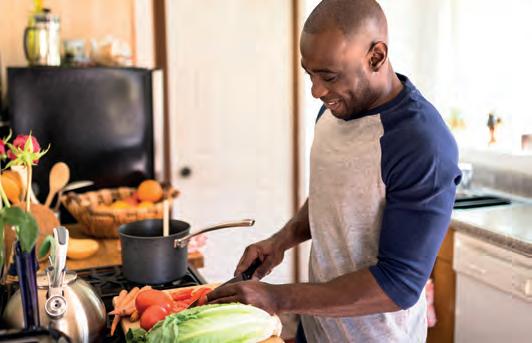
We don’t have high-quality evidence to say what foods could be helpful
your treatment if it isn’t working well for you.
When you read your test results, you might find your results are compared to a reference range. These ranges are based on the typical ‘normal’ test results of a large group of healthy people. You might find that your faecal calprotectin level seems higher or lower than you were expecting, but results can mean different things for different people. If you need help interpreting your test results, ask your doctor or IBD team.
People with Crohn’s or Colitis are more likely to have mouth and tooth problems than people without these conditions. In fact, some people might get mouth problems before they experience gut symptoms. These can include:
• Mouth ulcers
• Swelling or lumps in your lips, face, tongue, gums or the inside of your cheeks
• Gum disease
• Sores at the corner of your mouth
• White or yellow spots inside your mouth (a condition called pyostomatitis vegetans)
• Swelling of the gums and lips with ulcers in the lining of your mouth (a condition called orofacial granulomatosis)
• Yeast infections
• Tooth decay
• Dry mouth
• Smelly breath
• Changes in taste
Scientists think tooth and mouth problems in people with Crohn’s or Colitis could be due to a combination of things, such as:
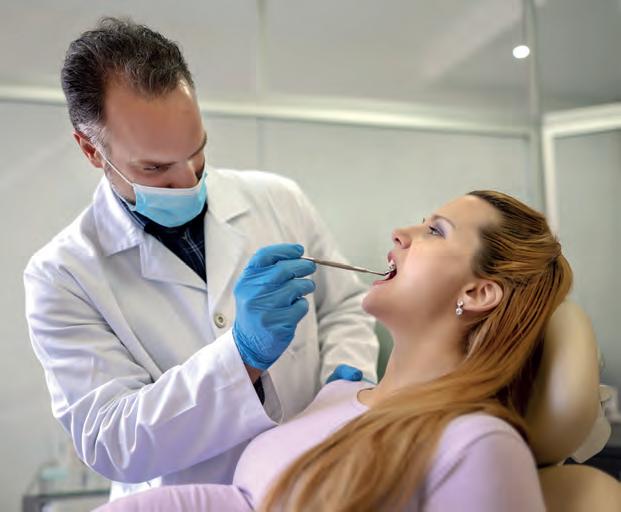
• The conditions themselves
• Changes in your immune system
• Changes in the bacteria that live in your mouth
• Changes in your diet
• Side effects of treatments
• Low levels of vitamins and minerals
mouthwash. If you have inflammation or ulcers, a steroid might help.
Occasionally, you might need other treatments. These depend on the exact problem you have and what has caused it. For example, a mouth infection might need antibiotic or antifungal treatment. If your problem is caused by low levels of vitamins or minerals, you may need to take supplements. If it is a side effect of your treatment, your IBD team might suggest stopping or switching medicines. To help prevent tooth and mouth issues, you could try:
• Going for regular check-ups with a dentist
• Brushing your teeth with a fluoride toothpaste
• Using fluoride mouthwash
Most of the time, getting your Crohn’s or Colitis under control helps with mouth problems, and no special treatment is needed. However, if your mouth is very sore, your GP or IBD team may prescribe a pain-killing gel or
• Reducing the amount of sugar you eat (but try to avoid artificial sweeteners because they can cause diarrhoea)
“Some people might get mouth problems before they get gut symptoms”
to people around me, saying I didn’t have a stoma bag or a scar.
That’s why, when I got out of that relationship, I started raising awareness and became passionate about breaking stigmas and making changes. I have gone through a journey to acceptance of my body. I’m never going to let anyone feel the way I was made to feel.
The reaction to the video I made for Crohn’s & Colitis UK’s early diagnosis campaign was incredible.
Friends and family had all shared that journey with me, but hearing the effect it had on strangers who’d seen it online, I realised how important it is to keep fighting for others, breaking down barriers to diagnosis, and tackling stigma.
Natalie-Amber Freegard, a dancer and model from Swindon, tells us why she’s backing our campaign for early diagnosis
1
Having the diagnosis of Crohn’s was just a relief. I’ve gone from not being able to live life at all, to enjoying simple things like eating food and studying for exams.
I had a relapse last year, so I’m experiencing some challenges, but I’m still here.
2
Surgery gave me my life back. But when I first got my stoma bag, I was in an emotionally abusive relationship. My ex-partner would make fun of my bag and it was awful. At my lowest point in 2018, I was still very underweight, but I was lying
In intensive care, you have limits on the number of visitors you can have, so no one could help me take care of my hair. It became so matted, I had to cut it all off.
I’d nearly died, then I’d woken up from an emergency operation with a stoma bag. So when my hair went, it was another blow. Now, I’m working with my local hospital to make curly hair products and appropriate brushes available in the intensive care unit for patients of colour.
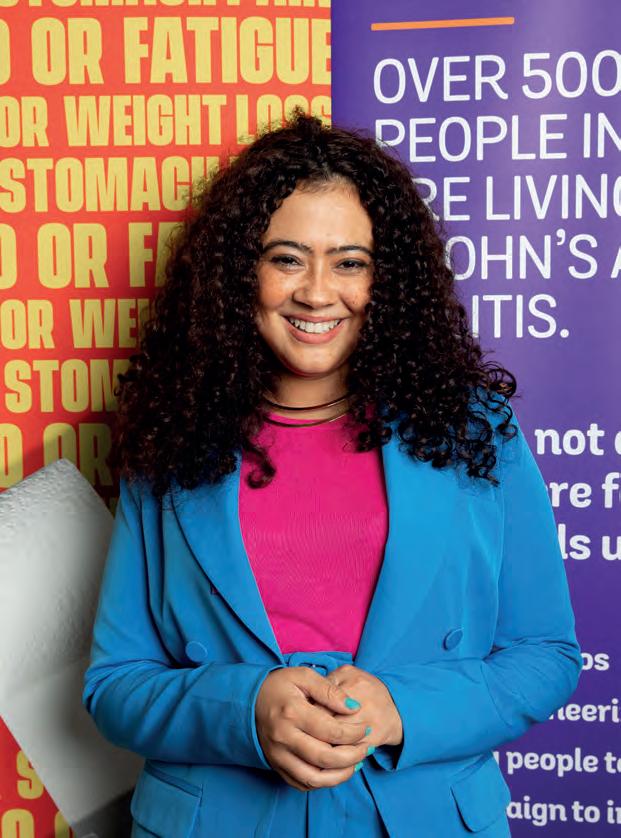
Your Will is your personal way of continuing to support the people and causes that have been most important to you in life.
After providing for loved ones, a gift in your Will to Crohn’s & Colitis UK is your legacy of hope for each person affected by Crohn’s and Colitis.



To find out more or to order a free information pack about how your lasting gift will help bring us closer to our vision of a world free from Crohn’s and Colitis, go to:
crohnsandcolitis.org.uk/legacy


“Gifts in Wills make our vision of a world free from Crohn’s and Colitis possible. Without the thoughtfulness of those who remember us in their Will, we would simply not be in the position that we are today to improve diagnosis and treatment; fund research into a cure; raise awareness and to give people hope, comfort and confidence to live freer, fuller lives. A gift in your Will to Crohn’s & Colitis UK – no matter how big or small – is a legacy of hope for each person affected by Crohn’s and Colitis now and in the future.”
Sarah Sleet, Chief Executive, Crohn’s & Colitis


By signing up to Crohn’s & Colitis UK Healthcare Direct you can have your stoma appliances and prescription medicine delivered straight to your door, at no extra cost to you.
Crohn’s & Colitis UK Healthcare


Direct service offers you:

• A dedicated Personal Adviser who you can speak to or email
• All appliance and medication prescriptions delivered at the same time, discreetly to your door
• A regular monthly stock check means that you only order what you need –no more excess stock or unwanted boxes
• Access to a team of specialist stoma nurses (not available in Scotland due to NHS rules)
• Access to a Specialist Clinical Pharmacist for help or advice


“The service is fantastic. I was really struggling with problems with my stoma and I didn’t know what to do. I mentioned this to my personal advisor in the monthly check in call and they arranged for one of their stoma nurses, Kim, to call me. She was amazing!”
EmmaCall the team on 0800 142 2395 or email info@crohnscolitishealthcaredirect.org to register your interest and claim your free stoma support pack which includes a stoma tips booklet and a free bottle of hand sanitiser.